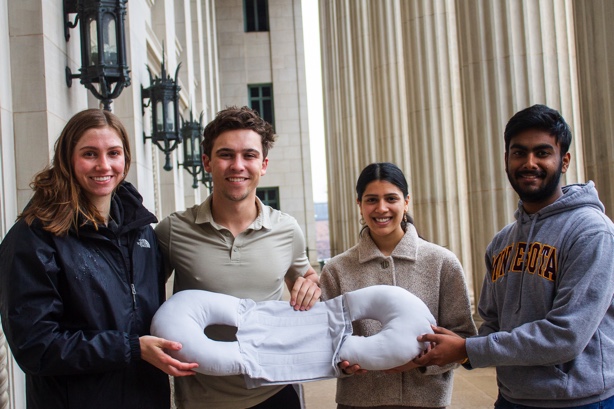Four University of Minnesota students in an entrepreneurship capstone class designed the Theodora Pillow to help people sleep more comfortably after having a mastectomy.
Kelli McCarthy, one of the students that designed the pillow, was inspired to create it after her mom was diagnosed with breast cancer. She said her mother experienced discomfort while sleeping after her mastectomy.
“My mom was trying to sleep with the tissue expanders, but it was super uncomfortable,” McCarthy said. “She’s a side sleeper, so sleeping on her side really hurt and she was restricted to sleeping on her back for a month.”
The students that designed the Theodora Pillow — Avni Tripathi, Sayuj Suresh, McCarthy and Chris Wandling — went on Facebook to talk with other people who had mastectomies to see if this is a common issue, McCarthy said. After getting in contact with others experiencing the same issue, they understood that this discomfort was a frequent problem, Tripathi said.
“We knew the main problem was when the chest was on the bed it was super painful,” Tripathi said. “With this existing concept, something needed to be there to support it.”
Tripathi said after the group designed the pillow, she sewed the early prototypes to give to people that had undergone a mastectomy to test. The pillow has velcro fabric flaps on the side of the pillow to wrap around the person’s body so when they turn to their side, the pillow is there.
After receiving feedback from product testers, the group redesigned the product to better fit their needs. They changed to using a softer fabric and more of a memory foam filling, McCarthy said.
The group decided to name the pillow the Theodora Pillow after a sixth-century empress of Byzantium, who was known for her fight for women’s rights, according to their website.
John Stavig, the professor of the entrepreneurship class, said the class has evolved since it started in 2005. In recent years, the students have been working in smaller groups and have focused on important issues. Some of the students have taken their product beyond the classroom and continued with it after graduation.
“With the problems that are meaningful to them, they’re able to persevere and drive through because it’s much more worthwhile,” Stavig said.
Each group is given up to $15,000, depending on how much they need for production, Stavig said. Along with the budget, they are given opportunities to work with manufacturers and gain knowledge of what it is like to create a start-up company.
The Theodora Pillow group has worked together to grow and evolve a product based on a problem McCarthy came across in her personal life. The group said they are interested in finding a way to continue with this product and grow their business after the class is over.
“We plan to finalize our product with a manufacturer, then move to selling it. If we find success there, and we get better feedback, then we will decide our next steps,” Tripathi said.
Avni Tripathi is a former Minnesota Daily staff member.



















